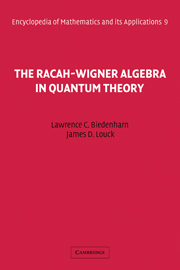Book contents
- Frontmatter
- Contents
- Contents of companion volume
- Editor's Statement
- Section Editor's Foreword
- Preface
- Acknowledgments
- Introduction by George W. Mackey
- The Racah–Wigner Algebra in Quantum Theory
- Chapter 1 Introduction
- Chapter 2 Algebraic Structures Associated with Wigner and Racah Operators
- Chapter 3 Null Space Properties and Structure Theorems for RW-Algebra
- Chapter 4 W-Algebra: An Algebra of Invariant Operators
- Chapter 5 Special Topics
- Appendix of Tables
- List of Symbols
- Author Index
- Subject Index
Chapter 2 - Algebraic Structures Associated with Wigner and Racah Operators
Published online by Cambridge University Press: 05 June 2013
- Frontmatter
- Contents
- Contents of companion volume
- Editor's Statement
- Section Editor's Foreword
- Preface
- Acknowledgments
- Introduction by George W. Mackey
- The Racah–Wigner Algebra in Quantum Theory
- Chapter 1 Introduction
- Chapter 2 Algebraic Structures Associated with Wigner and Racah Operators
- Chapter 3 Null Space Properties and Structure Theorems for RW-Algebra
- Chapter 4 W-Algebra: An Algebra of Invariant Operators
- Chapter 5 Special Topics
- Appendix of Tables
- List of Symbols
- Author Index
- Subject Index
Summary
Introduction and Survey
The application of standard angular momentum techniques to physical problems leads in practice quite often to extensive algebraic manipulations; physicists have designated such calculations as “angular momentum technology” (Danos [1]), or more formally as “Racah algebra” (Sharp [2]), or even pejoratively as “Clebsch–Gordanology.” A considerable body of practical results, and methodology, has been accumulated in these applications. To organize this material into a coherent structure is an important problem, which we shall discuss and resolve in this chapter and the succeeding two chapters.
One can distinguish two very different approaches to the problem. It is only to be expected in practical applications involving the angular momenta of many particles that the results should be complicated, since from a formal view one is applying invariant theory to the construction of invariant functions over many variables. Group-theoretically, one is constructing invariants with respect to the diagonal SU(2) subgroup (generated by the total angular momentum) of the nfold direct product group SU(2) × SU(2) × … × SU(2) (generated by the n kinematically independent angular momenta of n particles).
Such a view of the “Racah–Wigner calculus” is a straightforward generalization of the Racah coefficient (6-j symbol) to the Fano coefficient (9-j symbol), …, leading to the 3n-j symbols. This generalization has been devel oped primarily by Jucys et al. [3] using graphical techniques, and in a variant form by El Baz and Castel [4].
- Type
- Chapter
- Information
- The Racah-Wigner Algebra in Quantum Theory , pp. 6 - 46Publisher: Cambridge University PressPrint publication year: 1984

